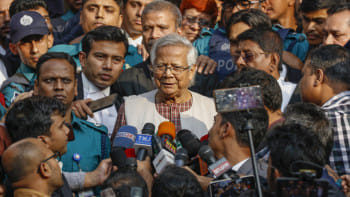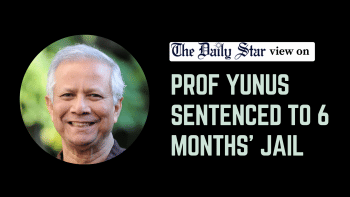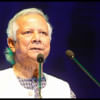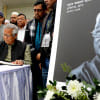For whom the bell tolls?

It was saddening to observe, on the first day of the New Year, 2024, a day which should have projected promise for the year ahead, that Bangladesh's sole Nobel laureate Professor Muhammad Yunus, a globally recognised and universally respected person, was sentenced to six months' imprisonment by a labour court. Yunus has by now attained a stature both at home and abroad to enable him to emerge unsullied from such a smear on his reputation. Some senior establishment figures have rather unconvincingly sought to delink the regime from this case, attributing it as a purely legal matter inspired by the Department of Labour—a small, obscure institution of the state.
Countless cases of labour rights violation are regularly taking place within an unjust society, and thousands of such cases remain pending in the labour courts as the case files there move at a snail's pace, judgments are few and far between, and jail sentences are rare to none. Few will be persuaded, given its traditional practices, that a functionary of the labour department would suo moto initiate a case—which may have global ramifications—and pursue it at an unprecedented pace wherein a sentence could be passed in record time.
Such a highly publicised judgment has already exposed our legal system and governance practices to public scrutiny. The 160 or so Nobel laureates and globally distinguished personalities who have already commented on the "judicial harassment" of Prof Yunus would be particularly concerned. Many of these personalities may now be inclined to apply their high-calibre minds to more closely scrutinise the particulars of the judgment by a labour court in Bangladesh so they can draw their own conclusions about the intrinsic merits of the case.
Whilst the Yunus judgment may be exposed to global scrutiny, it also demands that we in Bangladesh engage in some introspection as to the circumstances which culminated in exposing a person, who has invested the best part of his professional life in improving the lives of and empowering poor women in Bangladesh, to the prospect of imprisonment. This court case is not the first such instance wherein Yunus has been exposed to various forms of persecution. He is exposed to an ongoing campaign of denigration and slander from both official sources and their intellectual fellow travellers. No rationale, backed by evidence, has been provided to explain the logic, need or relevance of this adversarial relationship against such an individual.
When a nation has the good fortune of having a person of Yunus' stature in its midst, it may be expected that a leadership committed to the service of the country would attempt to reach out to him and all such people to invest their capabilities in supporting the government's nation-building mission. I am not aware of any single effort by our leadership to hold a dialogue with Yunus to sort out these imagined, or even real, differences. Nor has any effort been invested by our leaders in exploring how he could be deployed to serve as a resource for the nation or as an emissary to world leaders, who normally remain far beyond the reach of our ministers and diplomats.
Reflecting on this case, my most serious concern relates to its wider ramifications in regard to the state of governance and the future of democracy in Bangladesh. One-sided abuse of the law to oppress political opponents has been in practice over the years and dates back to predecessor regimes, whether from the cantonment or from the political domain. Over the years, the weaponisation of the legal system has become an element in the wider assault on our institutions of democracy and governance. Not just our legal system, but our administrative institutions, our law enforcement agencies, our constitutional bodies such as the parliament, the Election Commission (EC), the Anti-Corruption Commission (ACC), our central bank, and our National Board of Revenue (NBR) have all been used for partisan purposes—to the point that they have lost their capacity to function as rules-based pillars of governance. Each of these institutions has been politicised to serve the party in power, by persecuting opposition political parties, civil society, the independent media, and even individuals who may be deemed as critics of the government.
The case of Prof Yunus is symptomatic of this erosion in the credibility of our institutions. The triviality and narrowness of the case against Yunus would not have made it to first base in any well-functioning legal system. The thousands of political opponents languishing in prison and the large number of victims serving jail time without bail or being charged under the Damocles' sword that was the DSA illustrate the violation of our constitutional rights through denial of the protection of due process. Plainclothes persons, without any warrant, can come to any home in the middle of the night and drag you off to an unknown destination, to do with you what they will. Our law enforcement institutions can do so because they feel unaccountable before the law, while citizens fear they can no longer look to our courts to protect their constitutional rights.
The independence of the EC in conducting free, fair, and inclusive elections has been under challenge over consecutive elections. Our ACC has been used as an instrument to prosecute the political opposition whilst turning a blind eye to the conspicuous corruption that prevails in the ranks of a ruling party, its elected representatives, and favoured business cronies. The parliament itself, now exclusively dominated by the ruling party, has retreated from its responsibility as an institution of accountability over the executive. Its lack of urgency in addressing some of the burning concerns of the people remains conspicuous. Representation in our elective bodies, at all levels, is now monopolised by self-declared and prospective businessmen, many of whom prefer to use their office—divorced from the application of any conflict-of-interest rules—to pursue their business interests, thereby weakening the functioning of the competitive process.
Without the protection of the rule of law, business advancement—whether domestic or foreign—becomes a matter of political identity, having the right connections, and the deployment of material incentives. Our low inflow of foreign direct investment, compared to other Asian countries, originates in the concern of prospective investors over the arbitrary working of our institutions.
Without the support of rules-based institutions, civil society remains endangered, living out its life at the mercy of official institutions which hold its financial lifeline in their hands. There is no objective criteria to determine the fortunes of a civil society organisation which will depend on its equation with the powers that be and on its relations with the relevant officials.
In such a de-institutionalised universe, the assault on the rights of a person of the global stature like Dr Muhammad Yunus means that anyone—the political opposition, crony-less businessmen, CSOs, and outspoken individuals—remains an endangered species. In such circumstances, we should be aware that when the bell tolls for someone such as Professor Yunus, it may one day also toll for any of us.
Prof Rehman Sobhan is chairman of the Centre for Policy Dialogue (CPD).
Views expressed in the article are the author's own.
Follow The Daily Star Opinion on Facebook for the latest opinions, commentaries and analyses by experts and professionals. To contribute your article or letter to The Daily Star Opinion, see our guidelines for submission.

 For all latest news, follow The Daily Star's Google News channel.
For all latest news, follow The Daily Star's Google News channel. 











Comments